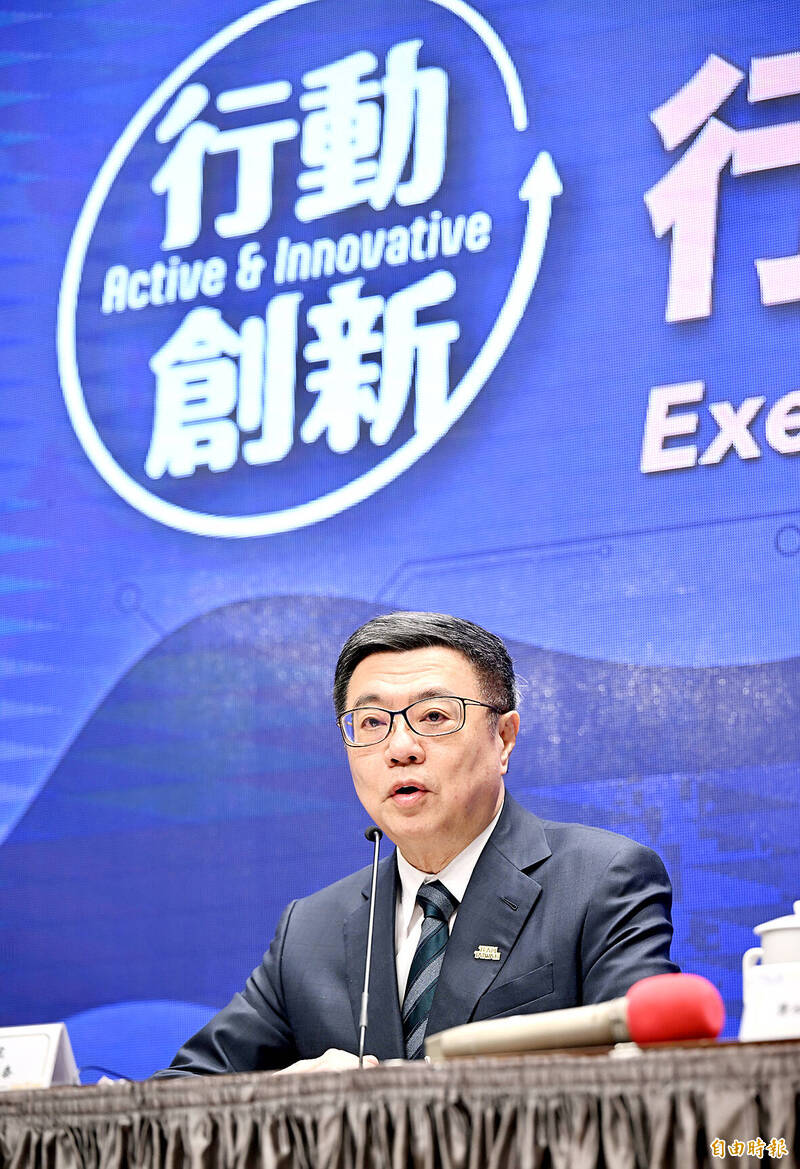《TAIPEI TIMES》Amendments greatest risk to Constitution: premier

Premier Cho Jung-tai speaks at a news conference in Taipei yesterday. Photo: Lo Pei-de, Taipei Times
‘POLITICAL MANEUVER’: Legal experts said that the amendments undermine the separation of powers and hinder people’s ability to seek redress over rights issues
By Chung Li-hua, Shih Hsiao-kuang and Lery Hiciano / Staff reporters, with staff writer and CNA
Recent amendments to the Constitutional Court Procedure Act (憲法訴訟法) have the potential to do the most damage to the Constitution of any legislative effort, Premier Cho Jung-tai (卓榮泰) told a post-Cabinet meeting news conference yesterday.
The legislature is scheduled to vote today on whether to reconsider the amendments after the Executive Yuan last week submitted a formal request to the Legislative Yuan to reconsider the bill, which passed its third reading on Dec. 20.
Calling the bill a political maneuver, Cho said that the amendments have the potential to paralyze the Constitutional Court, undermine the Constitution and deprive Taiwanese of their right to seek electoral redress.
Separately, 90 legal experts issued a joint statement stating that the amendments undermine the separation of powers outlined in the Constitution and hinder the ability of the public to seek redress when their rights are infringed.
The experts expressed concern regarding the future of Taiwan’s constitutional democracy and called for lawmakers to return the law to what it was.
The amendments stipulate that at least 10 grand justices be present to hear a case, while nine would be needed to back a ruling of unconstitutionality.
The Constitutional Court has 15 justices.
The previous regulations did not stipulate a minimum number of justices required to hear a case, requiring instead at least two-thirds of the justices, with rulings determined by a majority vote.
The number of justices can fluctuate due to terms expiring or other events and the time it takes to replace them.
The court has eight justices after seven completed their terms on Oct. 31 last year.
Opposition lawmakers rejected President William Lai’s (賴清德) nominees, meaning the court cannot hear cases or weigh in on constitutional matters.
The amendments addressed shortcomings and re-established the Constitution’s democratic ideals, the Chinese Nationalist Party (KMT) said yesterday, adding that the public has lost confidence in the court as the protector of the Constitution.
The two-thirds majority threshold is in line with other countries, the KMT said.
Lai should be open to suggestions from opposition lawmakers and nominate justices who are qualified to serve on the court, rather than people who are loyal to the Democratic Progressive Party (DPP), it said.
Public support for the amendments was 56.7 percent, compared with 30.6 percent who oppose them, the KMT said, citing a survey.
Most DPP voters are also in favor of the new rules, it said.
The Constitutional Court is not meant to be a political tool for those in power, it added.
If the vote to reconsider the amendments fails, there is still some room for discussion on how to interpret the amendments, Minister Without Portfolio Lin Ming-hsin (林明昕) said.
A judicial remedy known as “preventive relief” — which would provide a legal tool to protect people’s rights — could be proposed, but it would be up to the grand justices to decide whether it would be implemented, he said.
The new bill would paralyze the judicial system, DPP caucus chief executive Rosalia Wu (吳思瑤) told a separate news conference, asking why the KMT passed the amendments without discussion.
Legislative Speaker Han Kuo-yu (韓國瑜) failed to maintain neutrality in the debate by allowing the KMT to proceed without a discussion, Wu said.
The legislative and executive branches of government should be responsible and engage in dialogue, she added.
新聞來源:TAIPEI TIMES














